Materials: Traveller Light
The Screw fit range is a modular, cup-to-bottle system that lets you twist together the Traveller light cup into a Helix bottle, or an insulated flask.
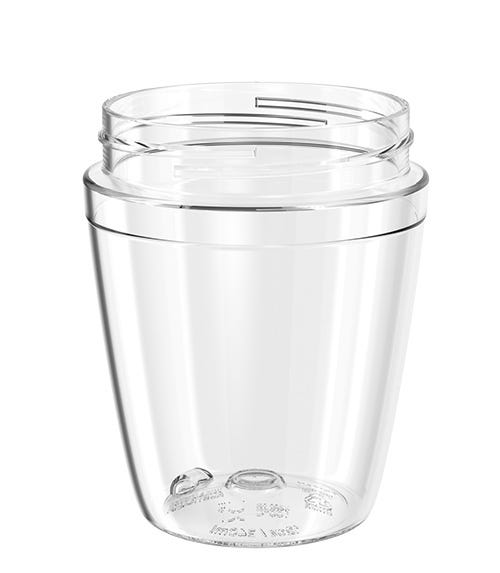

Leakproof Clear Cup
Clear plastic 50% Tritan Renew.
The clear screw-fit cup is the foundation part for the leakproof Traveller Mug and Bottle. Clear and lightweight, it's the perfect companion when you are out and about.
Benefits
- Lightweight, heat resistant and durable.
- Internal volumes replicate industry standard sizes for the correct coffee:milk ratio.
- When used as a Bottle, the dual opening provides a large opening to easily add boba, ice and fruit. This makes it easy to clean.
Material information
Tritan is a brand name for clear copolyester plastic - a durable, lightweight and unbreakable alternative to glass. The precision of injection molding and low embodied energy during manufacture means it has low carbon emissions impact.
Part manufacture
Australia
Manufacture waste
Currently in Australia there is no local commercial recycling option for clear plastic (Tritan). We are storing any customer returns, reject stock and waste at our manufactures while we search for a solution in conjunction with raw material distributor.
Assembly waste
In United Kingdom and Australia there is no local commercial recycling option for co-polyester (Tritan). We are storing any identified reject parts, customer returns, while we search for a recycling solution.
End of life
Co-polyester Tritan cup may be placed in your recycling bin if your local curbside collection accepts #7 hard plastics, but like most plastics it is likely to go to landfill.
Less than 10% of all plastic ever produced has been recycled. Currently, 40% of all plastic produced globally is for single-use packaging. Reusable solutions are the only way forward to meaningfully reduce waste and pollution.
Band
Silicone (synthetic elastomer) #7
Benefits
- Heat resistant to protect touch. Flexible, durable and non-porous - making it highly resistant to degradation.
- Great non-slip properties, so you can hold tight when drinking on the go.
Material information
Silicone is not a natural material, but a synthetic elastomer (soft plastic). While it is made up of carbon, hydrogen, oxygen and silicon- which comes from silica and is derived from sand, the silicone manufacture process involves extracting silicon from silica, passing it through hydrocarbons (fossil fuels) then mixing with other chemicals.
Part manufacture
China
Manufacture waste
Reject stock at point of manufacture is desiccated and made into silicone oil, which is used in a wide range of industrial applications.
Assembly waste and customer returns
We collect any reject stock, misprints and customer returns. We are storing these in Australia and the UK whilst we search for a local solution.
End of life
Silicone requires a dedicated commercial recycling collection which is not offered by residential curbside collection. Discarded bands go to landfill.
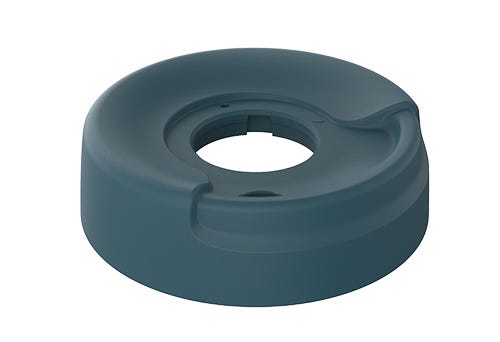

Twist Fit Lid
Lid: polypropylene plastic (PP) #5
Lid gasket: silicone (synthetic plastic elastomer) #7
Benefits
- Fully sealed twist fit sipper lid, with a dual plug mechanism that seals drinking hole from underneath when top plug is in closed position, and by silicone gasket at the rim.
- Designed for drinking pleasure on the go and as a sipper lid. A concave shape that allows room for your nose when drinking and mouthpiece sized for optimal liquid flow, which ensures drinking pleasure on the go.
- Quick to screw on – with a half twist, fitting easily into a busy service environment.
Material information
Polypropylene is one of the most widely used plastics for reusable food safe products and is free from BPA, BPS, phthalates including DEHP, lead and cadmium. It’s a tough, rigid plastic with a high melting point, so it can be heated to very high temperatures, making it fit for purpose for long term reuse. The precision of injection moulding and the low embodied energy during manufacture means it has low carbon emissions.
Silicone provides a high-performance mechanical seal thanks to its thermal properties, flexibility and compression capability. Silicone is not a natural material, but a synthetic elastomer (soft plastic). The silicone manufacture process involves extracting silicon from silica, passing it through hydrocarbons (fossil fuels) then mixing with other chemicals.
Part manufacture
Lid – Australia
Lid Gasket – China
Manufacture waste
Polypropylene reject stock, extrusion and tool part waste is ground into pellets and used to manufacture products that are not required to be food safe, or colour matched.
Silicone reject stock at point of manufacture is desiccated and made into silicone oil, which is used in a range of industrial applications.
Assembly waste and customer returns
Any customer returns and reject polypropylene parts from assembly are collected and returned (sorted by material) to the manufacturer to be pelletised and used to manufacture products not required to meet food safety standards.
We collect any reject silicone gasket stock and are storing these in Australia and the United Kingdom whilst we search for a local solution.
End of life
Polypropylene is readily recycled via most household waste service collections worldwide. Please place in your recycle bin for collection.
Less than 10% of all plastic ever produced has been recycled. Currently, 40% of all plastic produced globally is for single-use packaging. Reusable solutions are the only way forward to meaningfully reduce waste and pollution.
Silicone requires a dedicated commercial recycling collection which is not offered by residential curbside collection. Discarded bands go to landfill.
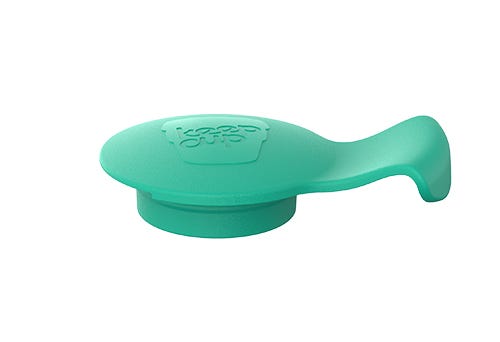

Top Plug
Polypropylene (PP) #5 plastic
Benefits
- Turn plug to closed position and press down to prevent spills in transit. Plug covers drinking hole mouthpiece when not in use.
- Ease of rotation while drinking on the go.
Material information
Polypropylene is one of the most widely used plastics for reusable food safe products and is free from BPA, BPS, phthalates including DEHP, lead and cadmium. It’s a tough, rigid plastic with a high melting point, so it can be heated to very high temperatures, making it fit for purpose for long term reuse.
The precision of injection moulding and the low embodied energy during manufacture means it has low carbon emissions.
Part manufacture
Australia
Manufacture waste
Reject stock, extrusion and tool part waste is ground into pellets and used to manufacture products that are not required to be food safe, or colour matched.
Assembly waste
Customer returns and reject parts from assembly are collected and returned (sorted by material) to the manufacturer to be pelletised and used to manufacture products not required to meet food safety standards.
End of life
Polypropylene is readily recycled via most household waste service collections worldwide. Please place in your recycle bin for collection.
Less than 10% of all plastic ever produced has been recycled. Currently, 40% of all plastic produced globally is for single-use packaging. Reusable solutions are the only way forward to meaningfully reduce waste and pollution.
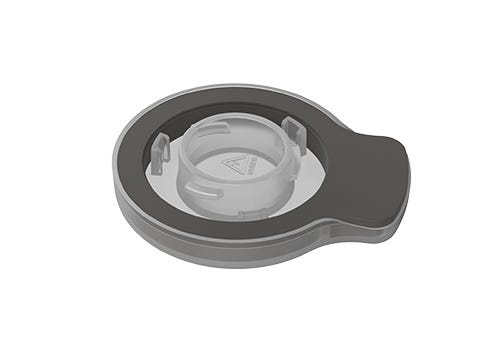

Base Plug
A modified polypropylene (PP) clear plug base body provides a rigid structure, while the overmoulded dark grey thermoplastic elastomer (TPE) creates a seal. The combination of both materials means the plug base is a polypropylene alloy, reclassified from the traditional polypropylene (PP) #5 to #7 plastic.
Benefits
- Seals from underneath when top plug is in closed position, preventing spills while in transit.
- Vertically lowers as top plug opens, to allow optimal liquid flow.
- Overmoulded seal provides soft flexibility and compression required for sealing.
Material information
Polypropylene is one of the most widely used plastics for reusable food safe products and is free from BPA, BPS, phthalates including DEHP, lead and cadmium. It’s a tough, rigid plastic with a high melting point, so it can be heated to very high temperatures, making it fit for purpose for long term reuse. The precision of injection moulding and the low embodied energy during manufacture means it has low carbon emissions.
The TPE inner seal provides the soft flexibility and compression to ensure necessary sealing. TPEs are most commonly a mix of plastic and rubber. They have the properties of rubber but are processed the same way as plastic and are recyclable.
Part manufacture
Australia
Manufacture waste
Reject stock, extrusion and tool part waste is ground into pellets and used to manufacture products that are not required to be food safe, or colour matched.
Assembly waste
Customer returns and reject parts from assembly are collected and returned (sorted by material) to the manufacturer to be pelletised and used to manufacture products not required to meet food safety standards.
End of life
Your base plug may be placed in your recycling bin if your local curbside collection accepts #7 hard plastics. Otherwise, discarded base plug will go to landfill.
Less than 10% of all plastic ever produced has been recycled. Currently, 40% of all plastic produced globally is for single-use packaging. Reusable solutions are the only way forward to meaningfully reduce waste and pollution.
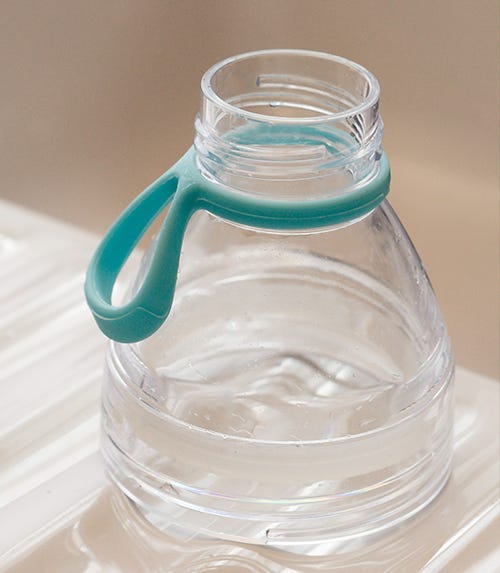

Bottle Extension – Original
Extension: Copolyester plastic (Tritan) #7
Extension gasket: silicone (synthetic plastic elastomer) #7
Extension bottle hang: silicone (synthetic plastic elastomer) #7
Benefits
- Made from reusable clear plastic that is lightweight and durable. Perfect for hydration on the go, with a silicone bottle hang for easy carry.
- Mouth opening is narrow and smooth rimmed for drinking pleasure and optimal flow of liquid.
- Extension opens with a half twist for easy removal, providing a large opening to allow addition of ice, boba or fruit, or to enjoy drinking straight from the cup.
Material information
Tritan is a brand name for clear copolyester plastic, a durable, lightweight and unbreakable alternative to glass. The precision of injection moulding and low embodied energy during manufacture means it has low carbon emissions impact.
Silicone provides a high-performance mechanical seal because of its thermal properties and compression capability. Its flexibility and durability provide carrying ease when used as bottle hang. Silicone is not a natural material, but a synthetic elastomer (soft plastic). The silicone manufacture process involves extracting silicon from silica, passing it through hydrocarbons (fossil fuels) then mixing with other chemicals.
Part manufacture
Australia
Manufacture waste
Currently in Australia there is no local commercial recycling option for clear plastic (Tritan). We are storing any customer returns, reject stock and waste at our manufactures while we search for a solution in conjunction with raw material distributor.
Silicone reject stock at point of manufacture is desiccated and made into silicone oil, which is used in a range of industrial applications.
Assembly waste
In United Kingdom and Australia there is no local commercial recycling option for co-polyester (Tritan). We are storing any identified reject parts, customer returns, while we search for a recycling solution.
We collect any reject silicone gasket stock and are storing these in Australia and the United Kingdom whilst we search for a local solution.
End of life
Tritan extension may be placed in your recycling bin if your local curbside collection accepts #7 hard plastics. Otherwise, discarded extension will go to landfill.
Less than 10% of all plastic ever produced has been recycled. Currently, 40% of all plastic produced globally is for single-use packaging. Reusable solutions are the only way forward to meaningfully reduce waste and pollution.
Silicone requires a dedicated commercial recycling collection which is not offered by residential curb side collection. Discarded bands go to landfill.
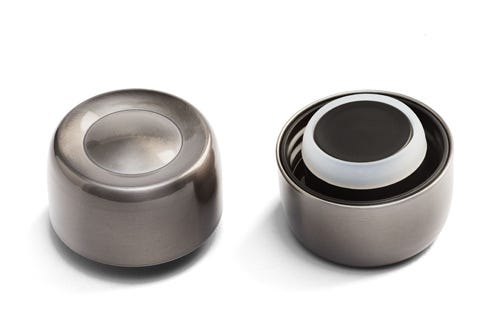

Bottle Cap
Bottle cap outer: 18/8 food-grade stainless steel
Bottle cap inner: polypropylene plastic (PP) #5
Bottle cap gasket: silicone (synthetic plastic elastomer) #7
Comprised from 3 materials, required to achieve small dimensional tolerance to seal with hot and cold water.
Benefits
- Bottle cap opens with a half twist for easy removal on the go and provides a leak proof seal.
Material information
Stainless steel 18/8 (also referred to as type 304) is the most common grade of stainless steel used for food preparation and dining due to its high quality, robust durability and non-corrosive nature. It’s known for its durability and reuse longevity and is a 100% recyclable resource without degradation. Due to its long life, high value and increasing demand, the average recycled content in current global stainless steel production is 25%. The stainless steel used for our cups comes from South Korea, a mill close to our manufacturer in China and is 35% recycled scrap content.
Polypropylene is one of the most widely used plastics for reusable food safe products and contains no bisphenol (BPA/BPS). It’s a tough rigid plastic with a high melt point, so it can be heated to very high temperatures, making it fit for purpose for long term reuse.
Silicone provides a high performance mechanical seal because of its thermal properties, flexibility and compression capability. Silicone is not a natural material, but a synthetic elastomer (soft plastic). The silicone manufacture process involves extracting silicon from silica, passing it through hydrocarbons (fossil fuels) then mixing with other chemicals.
Part manufacture
China
Manufacture waste
Stainless steel parts that do not meet quality standard are collected and sold back to the mill for use in production. Scrap metal content is mixed with raw material as standard industry practice.
Polypropylene reject stock, extrusion and tool part waste is ground into pellets and used to manufacture products that are not required to be food safe, or colour matched.
Silicone reject stock at point of manufacture is desiccated and made into silicone oil, which is used in a range of industrial applications.
Assembly waste
Customer returns and reject parts from assembly are collected and sent to commercial recycling. Along with other collected metal material, they are shipped to Germany for reprocessing. Due to material long life, high value and increasing demand, the average recycled content in current global production is 25%. Scrap is valuable for the raw elements it contains, such as chromium and nickel, and for the reduced raw material required.
We collect any reject silicone gasket stock and are storing these in Australia and the UK whilst we search for a local recycling solution.
End of life
All types of steel are 100% recyclable and can be recycled an infinite amount of times and uses 75% less energy that making steel from raw materials. As such, while stainless steel cannot currently be added to kerbside recycling, it can be dropped off at local recovery waste centres with any other household scrap metals. If your vacuum seal is compromised by puncturing or dropping, we ask that you please continue to use it for those occasions where you don't need thermal properties, rather than throwing away.
Packaging
100% FSC certified board, using soy based inks. Recycled cardboard cradle insert, to protect glass in transit. Tells the story of the brand to inspire reduce and reuse.
Benefits
- In addition to telling the story of our products and their benefits, we design packaging that walks the line - avoiding breakage and protecting products in transit while minimising material to reduce waste.
- Where possible, we work with customers to ship orders bulk packed and semi assembled, without retail packaging, to reduce waste.
Carton packaging material
Our recycled cardboard cartons are designed to maximise the number of product configurations, and are made in Australia and the UK to service local markets. All packaging materials are reused within our supply chain and packing processes. The cartons themselves are used first to store and ship components to us from our manufacturers and are then reused in our assembly locations to ship products to our customers.
Part manufacture
Australia and the United Kingdom
Manufacture waste
100% of all retail and carton packaging reject stock and manufacture offcuts are collected and recycled.
Assembly waste
When packing orders, we reuse stock cartons and utilise cardboard waste as space filler. Any damaged cartons, reject retail boxes or unused packaging are commercially recycled.
End of life
All retail packaging and cardboard cartons are readily recycled via household waste service collections worldwide. Please place in your recycle bin for collection.









